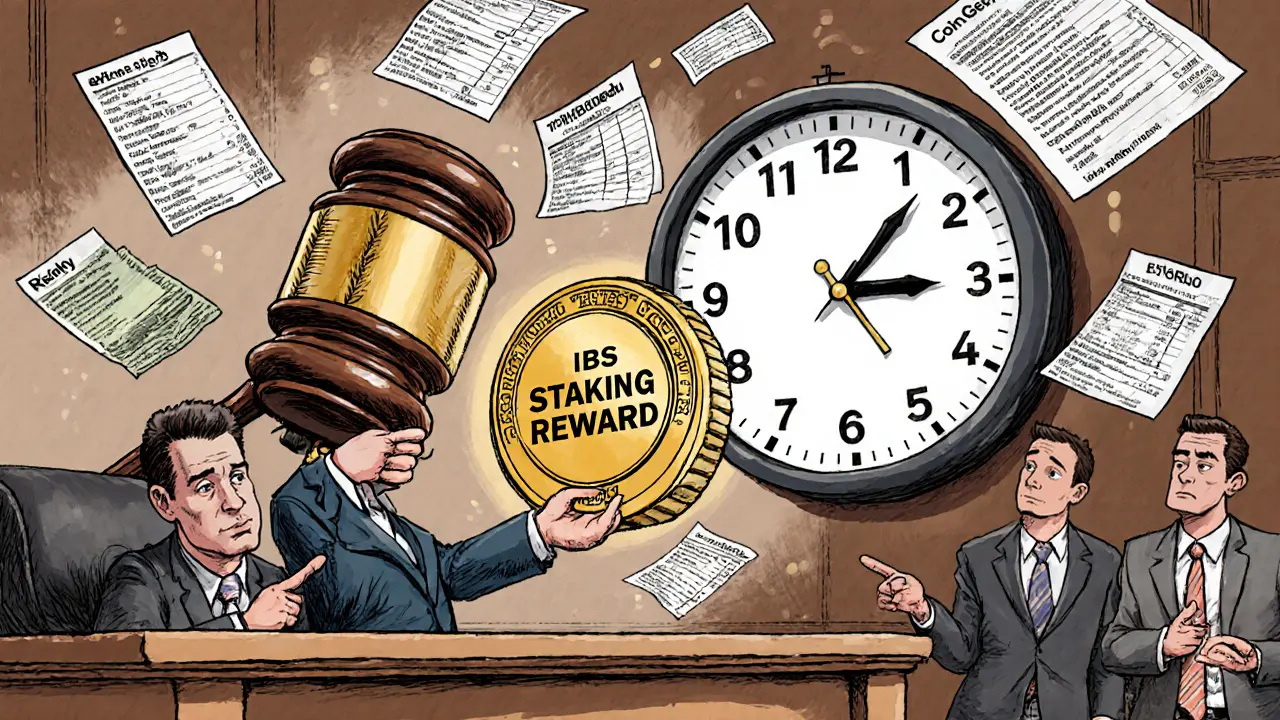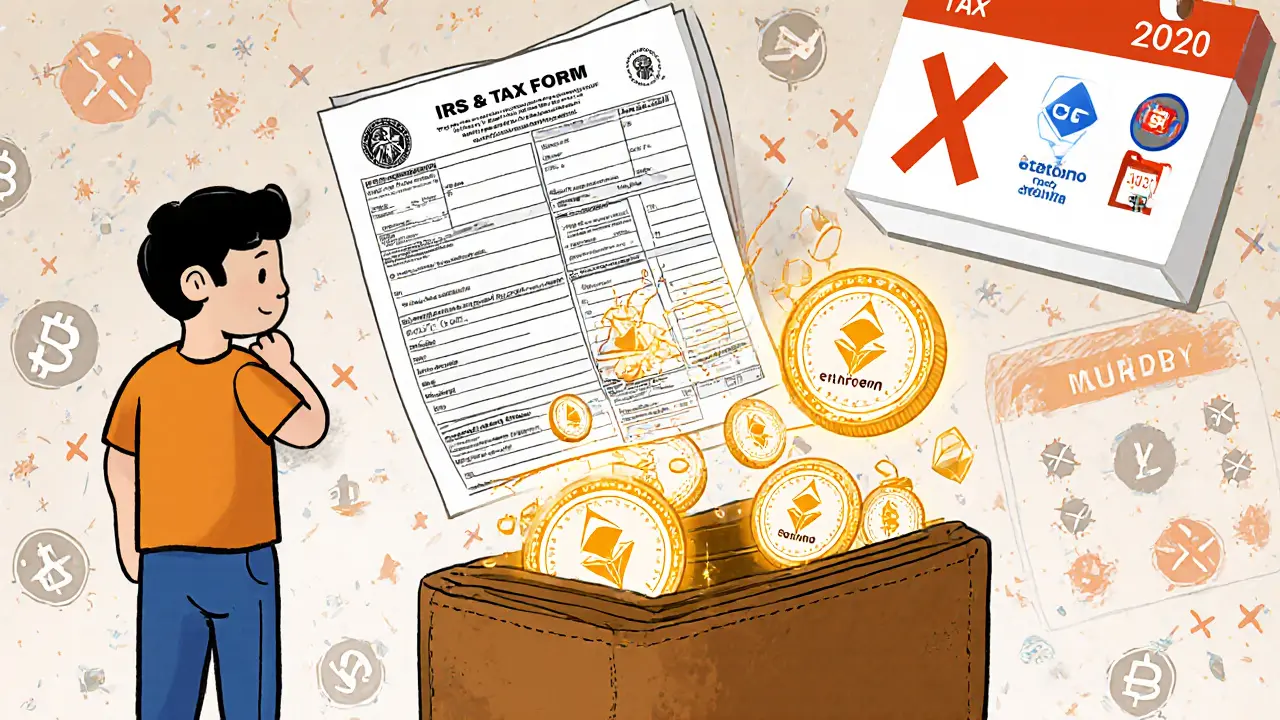Staking Rewards Tax Calculator
Staking Rewards Tax Calculator
Calculate your tax liability on staking rewards based on IRS guidelines. Staking rewards are considered taxable income when received, not when sold.
When you earn staking rewards from Ethereum, Cardano, or Solana, the IRS doesn’t see it as a gift or a bonus-it sees it as income. And that means you owe taxes on it, right then and there, even if you never sell a single coin. This isn’t speculation. It’s the law, as clarified by the IRS in July 2023 with Revenue Ruling 2023-14. If you’re staking crypto and haven’t figured out how taxes apply, you’re risking an audit, penalties, or worse.
When Exactly Do You Owe Tax on Staking Rewards?
The key moment isn’t when you cash out. It’s not when you see the reward in your wallet. It’s when you have dominion and control over it. That’s the legal phrase the IRS uses. It means the second your staking reward lands in your wallet-whether it’s a personal wallet, a hardware wallet, or even one on Binance or Coinbase-you’re taxed on its value in U.S. dollars at that exact moment.
Let’s say you stake 10 ETH and get 0.03 ETH as a reward on March 12, 2025. On that day, ETH is trading at $3,200. Your taxable income? $96. Not $96 when you sell. Not $96 when you move it. $96 on March 12. The IRS doesn’t care if you hold it for five years. You owe income tax on that $96 in the year you received it.
This rule applies whether you stake directly on the blockchain or through a centralized exchange. No exceptions. Even if the platform doesn’t let you withdraw the reward right away, if you can transfer, sell, or trade it-even partially-you’ve hit the taxable moment.
How Much Tax Do You Actually Pay?
Staking rewards are taxed as ordinary income. That means they’re added to your other income-your salary, freelance gigs, side hustle-and taxed at your regular income tax rate. If you’re in the 24% tax bracket, that $96 reward costs you $23.04 in federal taxes alone. State taxes? That’s another layer. California, New York, Washington-they all tax crypto income too.
Here’s the catch: you might not have cash on hand to pay. If you earned 0.5 SOL worth $150 but never sold any crypto, you still owe taxes on that $150. Many people get caught off guard. They think, “I didn’t make any money-I just got more crypto.” But the IRS doesn’t see it that way. They see you gaining value. And value = taxable income.
What Happens When You Sell Your Staking Rewards?
Now, here’s where it gets layered. When you eventually sell, trade, or spend those staking rewards, you trigger a second tax event: capital gains.
Let’s go back to the example. You got 0.03 ETH on March 12, 2025, when it was worth $96. You hold it. On November 1, 2025, ETH hits $3,800. You sell 0.03 ETH. That’s now worth $114. Your capital gain? $114 - $96 = $18.
If you held it less than a year? Short-term capital gain. Taxed at your ordinary income rate-same as your salary. If you held it over a year? Long-term capital gain. That’s taxed at 0%, 15%, or 20%, depending on your income. So you paid tax on $96 as income. Then you pay tax again on the $18 gain. Double taxation? Yes. That’s how the IRS treats crypto.

Are You a Hobbyist or a Business?
Most people stake as a side activity. But if you’re staking $50,000+ worth of crypto, running multiple nodes, using dedicated hardware, and treating it like a job-you might be running a business. And that changes everything.
Hobby stakers report staking rewards on Line 8 of Schedule 1 (Other Income). No self-employment tax. Simple.
Business stakers report on Form Schedule C. That means you pay self-employment tax (15.3%) on top of income tax. But you also get to deduct expenses: electricity for your rig, hardware costs, software subscriptions, even internet bills if you can prove they’re used primarily for staking.
How do you know which category you’re in? The IRS looks at:
- How much time you spend managing your staking
- Whether you’re trying to make a profit
- If you keep detailed records
- Whether you’ve changed your behavior to optimize returns
If you’re staking casually, you’re likely a hobbyist. If you’re running 10 nodes, tracking yield rates daily, and optimizing validator performance-you’re probably a business. Don’t guess. Get it right. Mistakes here can lead to underpayment penalties.
What About Exchange Reports?
Major exchanges like Coinbase, Kraken, and Binance now issue Form 1099-MISC for staking rewards. They send a copy to you and the IRS. If you receive one, you must report the income. If you don’t, the IRS knows. And they’re actively matching 1099s to tax returns.
One tax attorney in Austin told me about a client who ignored a $1,200 staking 1099-MISC. Two years later, the IRS sent a notice: “You owe $360 in taxes plus $240 in penalties.” The client didn’t even realize they’d received the rewards-they were staking on a wallet connected to Coinbase and forgot.
Don’t be that person. If you stake anywhere, assume they’re reporting it. Check your email. Check your account statements. Track every reward. Even small ones.

Record-Keeping: The One Thing You Can’t Skip
You need to track three things for every staking reward:
- Date received - exact UTC timestamp if possible
- Amount received - e.g., 0.045 ADA
- USD fair market value on that date - use a reputable price source like CoinGecko or CoinMarketCap
Don’t use the average price for the month. Don’t guess. Use the price at the exact time the reward hit your wallet. If you used a centralized exchange, check your transaction history. If you staked directly on a blockchain, use a block explorer like Etherscan or Cardanoscan to get the block timestamp and then cross-reference with historical prices.
Manual tracking? Possible if you staked once or twice. If you earned rewards weekly or monthly? You’ll drown in spreadsheets. Tools like Koinly, TokenTax, or Blockpit automate this. They pull data from your wallets and exchanges, calculate your income and capital gains, and generate the right IRS forms. Worth every dollar if you’re serious.
What’s Going to Change?
There’s a lawsuit challenging the IRS’s position: Jarrett v. United States. The taxpayer argues staking rewards are like mining gold-you don’t owe tax until you sell the gold. The IRS says no, you owe tax the moment you take possession. The Sixth Circuit heard oral arguments in 2023. A decision is expected in 2025 or early 2026.
But here’s the reality: even if the court rules in favor of Jarrett, it won’t change taxes for 2023, 2024, or 2025. The IRS won’t go back and refund taxes already paid. And Congress hasn’t passed any law to override the current rule. So for now, the IRS position stands.
Don’t wait for a legal win. Plan for the worst-case scenario: the current rules stay. Because if they do, and you didn’t pay, you’ll be in trouble.
What Should You Do Right Now?
Here’s your checklist for 2025:
- Export all staking transaction history from every wallet and exchange you used in 2025.
- Identify every reward-even tiny ones under $1.
- Look up the USD value for each reward on the exact date received.
- Calculate your total staking income for the year.
- Track when you sold or spent each reward to calculate capital gains.
- Decide if you’re a hobbyist or business and choose the right form.
- Use tax software to generate Schedule 1 or Schedule C.
If you’re overwhelmed, hire a crypto-savvy CPA. Look for someone who’s filed at least 50 crypto tax returns. Ask if they’ve handled staking rewards specifically. Most general CPAs still don’t understand this. Don’t risk it.
Staking is a powerful way to earn passive income from crypto. But it’s not free. The IRS isn’t waiting. And if you ignore this, you’ll pay more later-in penalties, interest, and stress.
Are staking rewards taxed in the U.S.?
Yes. The IRS treats staking rewards as ordinary income. You owe tax on the fair market value of the rewards in U.S. dollars the moment you gain control over them-whether you sell them or not. This applies whether you stake on a centralized exchange or directly on a blockchain.
Do I pay tax twice on staking rewards?
Yes, in a way. First, you pay income tax on the reward’s value when you receive it. Then, if you sell or trade it later and it’s worth more, you pay capital gains tax on the profit. That’s two separate taxes on the same asset. There’s no way around it under current IRS rules.
What if I didn’t receive a 1099 form?
You still owe tax. Not all platforms issue 1099s, especially if you stake directly on a blockchain or use a small exchange. The IRS doesn’t require you to receive a form to be taxed. If you earned rewards, you must report them. Assume the IRS knows if you used a major exchange-they’re reporting those.
Can I deduct staking expenses?
Only if you’re operating as a business. If you’re staking as a hobby, no deductions are allowed. If you’re running a staking operation like a business-with hardware, electricity, software, and time-you can deduct those costs on Schedule C. Keep receipts and records.
Is the tax law likely to change soon?
There’s an active lawsuit, Jarrett v. United States, challenging the IRS’s position. But even if the court rules in favor of the taxpayer, it won’t change taxes for past years. For now, the IRS’s 2023 guidance is the law. Don’t wait for change-plan around the current rules.

Just wanted to say this is one of the clearest breakdowns of staking taxes I’ve ever read. So many people think crypto is a tax-free playground, but this lays it out like a legal textbook with real examples. Huge thanks for taking the time to write this.
literally just got my first staking reward today and was like ‘wait… do i owe taxes on this??’
now i know. thanks for the clarity 😅
Man, I didn’t realize the IRS treats staking like income the second it hits your wallet. I thought it was like mining where you only pay when you sell. That’s wild. I’ve been staking on Kraken for over a year and never tracked the exact USD values. Guess I’m in for a fun tax season. Might just buy Koinly before April.
Staking is basically passive income with extra steps. You’re not just earning crypto-you’re earning taxable income. It’s like getting paid in gift cards but having to pay income tax on the face value before you even cash them in. The system’s broken, but at least now we know how to play it.
Interesting how the IRS conflates possession with realization. In classical economics, income is realized when there’s a change in wealth, not merely when you gain custody. The moment you receive a staking reward, you have no liquidity to cover the tax liability. This is regulatory overreach disguised as fiscal prudence. The state is essentially taxing phantom income. And yet, compliance is mandatory. Fascinating.
Double taxation on crypto is the new normal and nobody talks about it
They tax you when you get it then again when you spend it
That’s not tax policy that’s theft
For anyone feeling overwhelmed: start small. Just export your exchange history for 2025 and list the dates and amounts. You don’t need to nail the exact USD value for every single satoshi right away. Use CoinGecko’s historical tool-it’s free and accurate. One reward at a time. You’ve got this.
They’re watching everything. Every transaction. Every wallet. The IRS has AI that tracks crypto movements across 200+ platforms. They already know how much you earned. They’re just waiting for you to file wrong so they can hit you with penalties. Don’t be stupid. Track everything. Even the 0.0001 ETH rewards. They’re not small. They’re evidence.
Why do we even have to pay tax on crypto we didn’t sell? This is just the government trying to squeeze every penny out of people who are trying to build something new. They don’t understand blockchain. They just want control. And now they’re taxing dreams.
I staked some ADA last year and forgot about it. Got a 1099 in the mail and panicked. Turned out I owed like $18. Paid it. Didn’t cry. Just paid it. Sometimes the best move is just to do the thing. Don’t let fear stop you from doing the right thing.
So you’re telling me if I stake on a decentralized protocol and never touch a centralized exchange, I’m still liable? No 1099 means nothing? Then why even have exchanges report? It’s a trap. The IRS is setting up a net to catch everyone who thinks they’re anonymous. This isn’t tax law. It’s surveillance.
It’s funny how we treat crypto like money when it’s convenient-‘I bought a coffee with BTC!’-but the moment the IRS says ‘this is income,’ we all suddenly become economists arguing about realization events. The truth? You’re not a miner. You’re not a business owner. You’re just someone who got lucky with a protocol. And now you’re being taxed like a Wall Street trader. Welcome to the system, buddy.
If you’re staking more than $5k a year, you’re running a business. Period. No excuses. If you’re not tracking your electricity bill or the cost of your GPU, you’re not serious. And if you’re not deducting those expenses, you’re literally giving free money to the IRS. Stop being a hobbyist and start acting like a CEO. Your tax return will thank you.
Just wanted to add-don’t ignore the state taxes. I’m in Texas, so I’m lucky. But my friend in California got hit with over $1,200 in state taxes on $4k in staking income. That’s 30% on top of federal. Nobody talks about that. If you live in a high-tax state, you need to plan for that 40-50% total hit. It’s brutal.
i staked 0.02 eth and forgot about it then sold it 6 months later and now i have to file a capital gain on like 5 dollars?? this is so dumb
It’s impressive how the IRS has managed to turn a decentralized, permissionless system into a compliance nightmare. The irony is thick: blockchain was supposed to liberate us from centralized control… and now we’re filling out Schedule 1 like it’s 1998. The system always wins. But hey, at least we got NFTs.
While the IRS’s position on staking rewards is legally sound under current interpretations of the Internal Revenue Code, particularly under the doctrine of constructive receipt and the definition of gross income under Section 61, the practical implications are deeply concerning. Taxing income before liquidity is realized creates a cash flow crisis for individuals who may not have sufficient fiat to cover the liability. Moreover, the burden of tracking fair market value at the precise moment of receipt-down to the second-is administratively onerous, especially for non-technical users. The absence of clear guidance on forked assets, delegated staking, and multi-chain rewards further complicates compliance. While the Jarrett litigation presents a potential avenue for reform, until legislative or judicial relief is granted, taxpayers must navigate this complex landscape with meticulous recordkeeping and, where feasible, professional counsel. The current regime, while enforceable, is not equitable.
Thank you for the detailed breakdown. I’ve been advising clients on crypto taxation for over seven years, and your post captures the nuances better than most IRS publications. I particularly appreciate the distinction between hobbyist and business staking. Many CPAs still treat staking as a passive investment, not realizing the operational footprint required for business classification. The ability to deduct hardware, electricity, and software expenses under Schedule C is often overlooked-and it can make a meaningful difference in net liability. I encourage readers to document their staking activities as if they were running a small business, even if they don’t intend to. That documentation alone can protect them in the event of an audit. The IRS doesn’t reward ignorance. It rewards preparation.